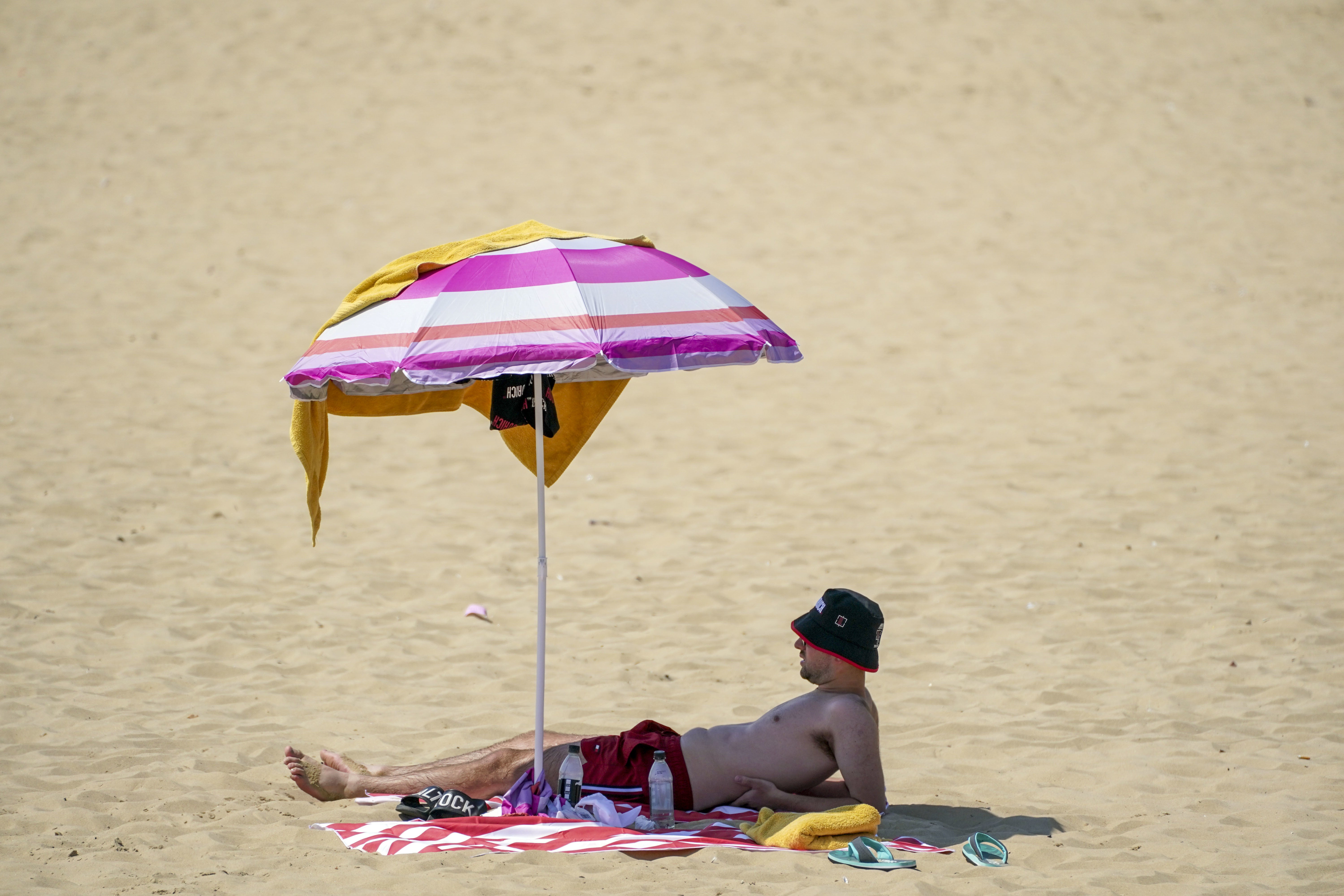Health warning for millions as heatwave heads for the UK
Monday was the hottest day of the year so far

Your support helps us to tell the story
From reproductive rights to climate change to Big Tech, The Independent is on the ground when the story is developing. Whether it's investigating the financials of Elon Musk's pro-Trump PAC or producing our latest documentary, 'The A Word', which shines a light on the American women fighting for reproductive rights, we know how important it is to parse out the facts from the messaging.
At such a critical moment in US history, we need reporters on the ground. Your donation allows us to keep sending journalists to speak to both sides of the story.
The Independent is trusted by Americans across the entire political spectrum. And unlike many other quality news outlets, we choose not to lock Americans out of our reporting and analysis with paywalls. We believe quality journalism should be available to everyone, paid for by those who can afford it.
Your support makes all the difference.A warning has been issued in the UK as the temperature is set to continue to rise.
The UK Health Security Agency (UKHSA) has issued yellow heat health alerts across most of England.
They will remain in place until Thursday, when forecasters expect temperatures will begin to return to their seasonal averages.
Monday was the hottest day of the year so far, reaching 28.3C in Wisley, Surrey, and temperatures are expected to rise even higher in parts of central and eastern England on Wednesday, the Met Office said.
Andrea Bishop, a Met Office spokeswoman, said it will continue to be “very warm” across much of the country over the next few days, though conditions in the west and the South West will be “nearer average temperatures”.
“Wednesday is a very warm day for many and we’re going to have top temperatures of 31C,” she said.
“We then transition to fresher conditions looking very likely through Thursday as a weakening band of cloud and showery rain runs east, south-east, across the country through the day.
“Although it could still be very warm ahead of this, for example in the east or south east of England.”
Heat exhaustion, heatstroke and dehydration are the main risks posed by heatwaves and hot weather.
NHS guidance says older people, especially those over 75 and female, are most vulnerable to heat-related illness, as well as people with serious or long-term illnesses, and very young children.
Age UK recommends older people take particular care not to spend too much time outside during the hottest part of the day – between 11am and 3pm – and keep the blinds down and windows closed to remain cool inside.
Dr Luke Powles, associate clinical director at Bupa Health Clinics, said it was important to know the symptoms of heat exhaustion, which include “a throbbing headache, dizziness, confusion, cramping and nausea” and heatstroke, which is much more serious.
“The symptoms of heatstroke include not sweating even while feeling too hot, a high temperature of 40C or above, fast breathing or shortness of breath, feeling confused, loss of consciousness and being unresponsive,” he added.
“Heatstroke is very serious and should be treated as an emergency.”
Drinking lots of water is a crucial way to avoid heat exhaustion and dehydration, alongside keeping cool and staying in the shade.
Dr Powles said: “We should drink 1.5 to two litres of fluid a day, which is about eight to 10 glasses. However, if you’re in the heat during the day you can become dehydrated quicker, so drink more often and aim for at least two litres.”
Sunseekers heading to the beach to bask in the warm weather should use at least factor 30 sunscreen (SPF) in order to avoid sunburn, which can increase the risk of developing skin cancer, it is advised, even if it is cloudy.
Older people are more susceptible to heat-related health issues as their bodies are less able to cope with the rising temperatures.

During the record-breaking heatwaves of summer 2022, more than 2,800 excess deaths were recorded among over-65s.
Rob Martin, managing director of care services at Anchor, said the later living charity was urging “the wider community to keep a close eye on older neighbours and their older relatives who may live alone and are more vulnerable in the heat.”
“We recommend older people stay hydrated and keep out of the sunlight as much as possible,” he added.
“In these temperatures, it’s important to avoid caffeinated drinks as they are dehydrating. Drink plenty of cold fluids like water and fruit juices. We recommend taking regular sips of hydrating drinks throughout the day.”
Heatstroke also poses a risk to pets, especially dogs left unattended in warm cars or taken for walks on hot days.
The RSPCA recommends ensuring pets have access to shade and fresh drinking water to help them keep cool.
London saw a peak of 27.4C at St James’s Park on Monday, while temperatures rose to 26.9C in Aberdeenshire, Scotland, and 25C in Northern Ireland.
However, the heat is expected to last only until Wednesday with heavy showers, thunderstorms and persistent rain possibly returning in the west as the week goes on and cooler conditions are ushered in.
Ms Bishop added the UK would see “more average temperatures and pressure conditions everywhere” from Friday.
Hot weather health problems – and how to solve them
As temperatures rise, it’s important for people searching for the sun to be safe and responsible outdoors.
So what exactly are the hot weather health problems and how can they be solved? Health experts share everything you need to know.
Dehydration
For Kiran Jones, clinical pharmacist at Oxford Online Pharmacy, dehydration can occur if you’re exposed to the sun for prolonged periods.
“During a normal day, the recommended amount of fluids is between 1.5 and 2.5 litres (six-eight glasses), but when you’re hot, you sweat more, so more fluid is needed to replenish water loss,” Jones said.
“This can result in you feeling extra thirsty, tired or dizzy, or experience headaches, constipation or even nausea. Plus, you’re likely to have dark, strong-smelling pee.
“To avoid this, maintain a steady flow of fluids throughout the day, ensuring you drink an equal amount of water to other beverages being consumed. And try to limit alcoholic drinks where possible as these can be a diuretic.
“Consider adding oral rehydration sachets to your water bottle at the beginning of each day. As they contain electrolytes like glucose, sodium and potassium, this can help to replace salts and water loss and reduce the effects of dehydration.”
Prickly heat
Excessive sweating can cause skin irritation which presents itself as a heat rash, known as prickly heat.
“This generally presents itself as a small cluster of itchy, prickly red spots in areas such as on the neck, upper chest, in the skin folds and armpits and on the waistline or under breasts,” said Jones.
“To prevent heat rash, try and avoid hot and humid areas, keep hydrated, keep the affected area dry and opt for loose-fitting cotton clothing to prevent overheating or skin irritation from coarse fabrics.
“If you notice a heat rash appearing, visit a pharmacist who can administer the best course of treatment. Recommended products include antihistamine tablets, hydrocortisone cream (not for young children) and calamine lotion.
“If your rash doesn’t improve after a few days, visit your GP for further medical advice.”
Heat stroke
Heat stroke can develop in a few hours and is caused by physical overexertion in hot and humid conditions.
“It happens when your body can’t cool itself down and things such as drinking alcohol, being dehydrated, taking drugs that affect the body’s ability to regulate temperature (sedatives, diuretics, tranquillisers and heart and blood pressure medicines), being obese, or having a disease or medical condition such as cystic fibrosis or problems with your heart, can put you more at risk,” said Jones.
“Symptoms to watch out for include delirium, weakness, dizziness, hot, flushed and pale skin, nausea and vomiting, amongst other things.
“This can be extremely dangerous if not treated immediately and can result in brain swelling, kidney failure, liver failure, metabolic dysfunction, nerve damage or reduced blood flow to the heart.
“So, to avoid this, try and avoid moving around and doing too much, ensure you consume plenty of water or sports drinks, seek shaded areas where possible and opt for lightweight clothes and a hat.
“If you think you or your friends might be experiencing any symptoms, seek medical advice immediately. While you’re waiting for assistance, apply ice packs to the neck, groin and armpits, immerse them in cool water, encourage them to drink water and monitor their breathing.
“Aspirin and paracetamol shouldn’t be taken in the event of heatstroke as they can interrupt the change in the hypothalamic set point caused by pyrogens.”
High blood pressure
According to Jones, high temperatures and humidity can be a bad combination for anyone who suffers from high blood pressure as the hot weather causes the heart to beat faster, circulating twice as much blood around the body.
“Also, some blood pressure medications like beta blockers and diuretics can affect the body’s ability to stay hydrated or respond to high temperatures,” she said.
“Anyone with a history of high blood pressure should drink plenty of fluids to stay hydrated and stay out of the sun where possible in a cool environment, wearing a hat if they are venturing outside.
“They should also monitor their blood pressure regularly during the heatwave. If it’s high or they are experiencing any worrying symptoms like extreme tiredness or confusion, a rapid pulse, excessive sweating, headaches, swelling their arms and legs or nausea, they should seek urgent emergency medical advice.”
Kidney damage
Carolina Goncalves, a superintendent pharmacist at Pharmica added that kidney damage in hot weather can result from a combination of dehydration and prolonged exposure to high temperatures, which can lead to reduced blood flow to the kidneys and subsequent kidney stress or injury.
“During periods of intense heat, the body sweats heavily to cool itself, losing not only water but also essential electrolytes. This extensive fluid loss, if not adequately replaced, can decrease blood volume, forcing the kidneys to work harder to concentrate urine and conserve water. Consequently, this heightened strain can impact kidney function and increase the risk of developing kidney stones or acute kidney injury,” she said.
“To mitigate the risk of kidney damage in hot weather, it is crucial to maintain hydration by consuming sufficient amounts of water throughout the day.
“Moreover, wearing light, breathable clothing and taking regular breaks in shaded or air-conditioned environments can help regulate body temperature and reduce kidney stress.”
Migraines
Hot weather induces a physiological response known as vasodilation, wherein blood vessels dilate, increasing blood flow throughout the body, including the brain.
“This increased cerebral blood flow can activate specific pain receptors, potentially triggering migraines. The likelihood of this occurring is further enhanced by the dehydration common on hot days,” said Goncalves.
“As the body perspires heavily under high temperatures, it loses significant fluid volume, leading to a decrease in blood volume. This reduction can temporarily impair the delivery of oxygenated blood to the brain, thereby exacerbating the symptoms of a migraine.
“Migraines are most effectively managed using a class of medications known as triptans. This group includes sumatriptan, rizatriptan, and zolmitriptan, among others. These drugs are specifically designed to combat migraine symptoms by constricting blood vessels and blocking pain pathways in the brain.”